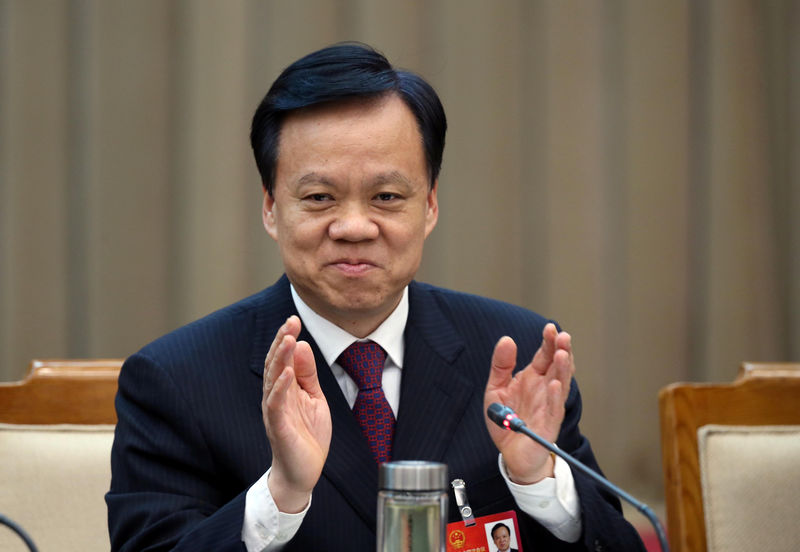By Philip Wen and Benjamin Kang Lim
BEIJING (Reuters) - When China rejuvenates its top leadership team towards the end of the year, sources close to senior leaders say President Xi Jinping could reveal his grip on power with a possible leapfrog promotion for Guizhou Communist Party boss Chen Miner.
Chen, a trusted confidant of Xi, has already ridden on the coat-tails of his former boss since they worked together in Zhejiang, where Xi was provincial party leader, and three sources with leadership ties think he could jump straight into the seven-member Politburo Standing Committee (PSC) during the 19th party congress in the autumn.
In national politics, Chen is currently only a member of the 205-member Central Committee, and an elevation to the PSC, which has ultimate power over the world's second-largest economy, would involve a two-step promotion, missing out the 25-member Politburo.
"Chen Miner is a dark horse," said a Chinese official who has worked with Chen. "He has a good relationship with Xi and is very competent. He gets things done."
"At the very least, Chen Miner will become a member of the Politburo," a source with ties to the leadership told Reuters.
Chen spent the first three decades of his career steadily rising through the party ranks in his native Zhejiang, where his career began to dovetail with Xi's from 2002, when the latter secured his first top provincial-level appointment.
An avid reader and Chinese calligraphy buff, Chen worked closely with Xi for more than four years as Zhejiang's propaganda chief, running Xi's regular column in the provincial newspaper and cultivating his growing profile.
In 2012, he left Zhejiang for the first time in his career to become Guizhou deputy party secretary. Less than a year later, and within roughly a month of Xi becoming president, Chen was promoted to governor, before being promoted again to his current role as Guizhou party boss in 2015.
"This is a person you certainly should pay a lot of attention to ... Xi Jinping really paved the way for his promotion," said Cheng Li, an expert on Chinese elite politics at the Brookings Institution. "He's known not only for his close ties with Xi but he's also a popular leader both in Zhejiang and Guizhou, so that puts him on a very fast track for promotion."
China's State Council Information Office, which doubles as the spokesman's office for the cabinet and the party, and the Guizhou government did not respond to requests for comment.
TOP PRIZE
For decades, Guizhou was one of China's most backward provinces, but in recent years the central government has poured in billions of yuan, with a focus on poverty alleviation and big data.
Guizhou's economy almost doubled between 2012 and last year, when it recorded the second-highest growth among China's 31 provinces and municipalities, and Chen has not been reticent in drawing attention to either his achievements or connections.
"Chen actually says he is close to Xi," said one China-based diplomat who has met him.
Other allies of Xi seen as possible contenders include Li Zhanshu, who heads the party's general office, and Zhao Leji, head of the Organisation Department, which oversees personnel decisions.
Another Xi lieutenant, top corruption buster Wang Qishan, who is already on the PSC, could be kept on despite having passed the unofficial retirement age of 68.
The PSC is ostensibly chosen by a vote in the Central Committee, but results are typically preordained by an opaque process involving horsetrading between the president, outgoing standing committee members, and party elders who remain influential.
If Xi does prove strong enough to appoint Chen to the PSC, it could be at the expense of candidates from rival factions, such as Guangdong party chief Hu Chunhua, from the Communist Youth League grouping close to former-president Hu Jintao, or Sun Zhengcai, who runs the metropolis of Chongqing.
Chongqing, however, was criticised by the party's anti-corruption watchdog this month for not doing enough to root out the influence of the city's former party chief Bo Xilai, jailed for life for a graft scandal in 2013.
Two-time Politburo member Wang Yang, a vice-premier from the Youth League faction, is also a contender.
Sun and Hu are also Politburo members, which puts them theoretically ahead of Chen in the pecking order, but there are plenty of high-profile examples of fast-rising cadres being groomed for the top with a jump from the Central Committee straight to PSC.
Both Xi and Premier Li Keqiang were fast-tracked in this fashion at the 17th party congress in 2007, as was former president Hu at the 14th congress in 1992.

If Chen makes the leap, that could leave the ultimate prize within his grasp when Xi steps down.